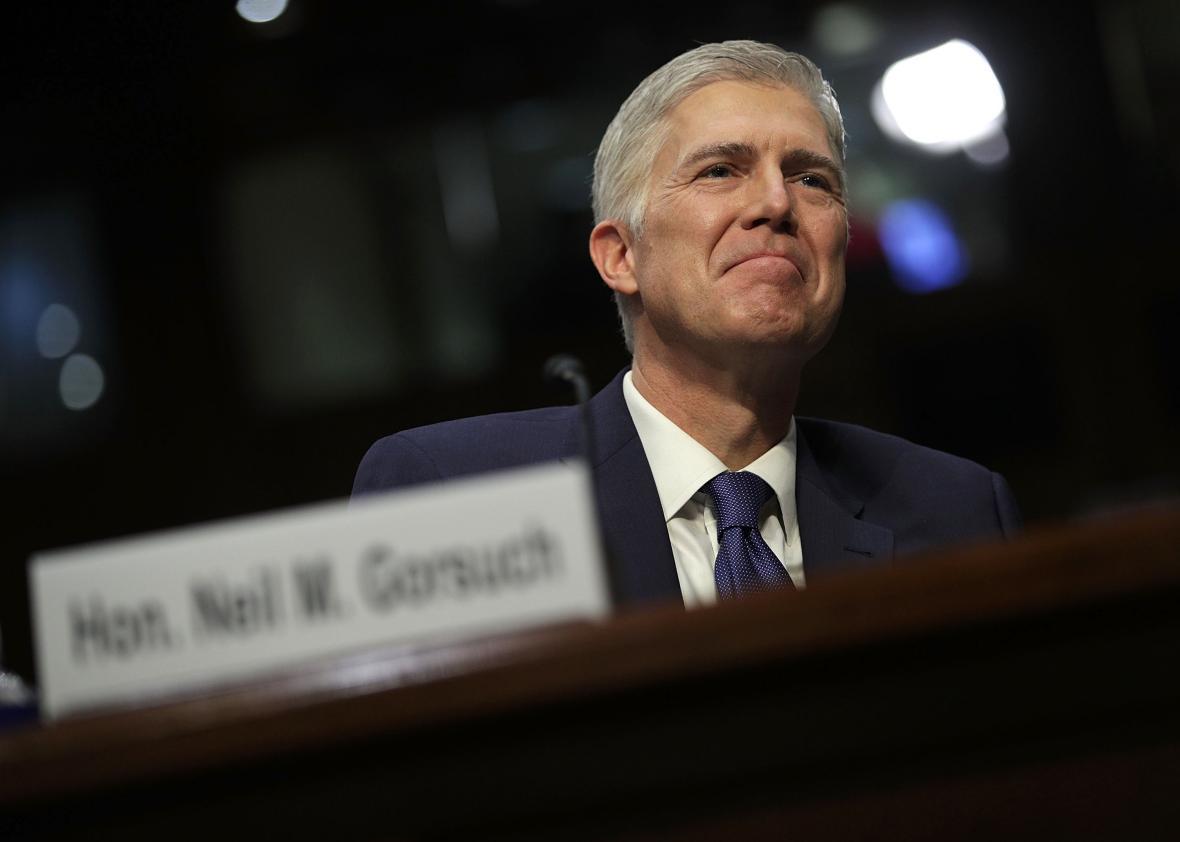On Monday, not long before the start of Senate confirmation hearings for Donald Trump’s Supreme Court nominee Neal Gorsuch, NPR released a startling story: According to one of the judge’s former law students, Jennifer Sisk, Gorsuch once made an extraordinarily sexist classroom comment. Sisk alleges that in April 2016, Gorsuch “interrupted our class discussion to ask students how many of us knew women who used their companies for maternity benefits, who used their companies to—in order to have a baby and then leave right away.”
When few students raised their hand, Gorsuch reportedly “became animated” and said, “Come on, guys. All of your hands should be up. Many women do this.” He later added, in Sisk’s words, that “companies have to ask these sort of questions at the interview so that companies can protect themselves.” Sisk brought her concerns to two deans, but it’s unclear whether they ever spoke to Gorsuch.
What should we make of these remarks? Sympathetic lawyers may be tempted to dismiss them as a law school hypothetical gone terribly awry, an unfortunate pedagogical misstep. But I find them to be quite revealing. The comments may seem out of character for Gorsuch himself, whose clerks, colleagues, and students have largely praised as a respectful professional. But they are not out of line with Gorsuch’s own opinions, which devalue the profound, constitutionally protected connection between women’s individual autonomy and economic equality. Gorsuch has already admitted that he holds corporations’ “religious freedom” in higher esteem then women’s liberty. So it is not at all surprising to discover that he also values corporate interests over a woman’s right to be free from pregnancy discrimination.
The starting point of any discussion about reproductive freedom and economic equality is Planned Parenthood v. Casey, in which the court famously asserted that the “ability of women to participate equally in the economic and social life of the Nation has been facilitated by their ability to control their reproductive lives.” Justice Ruth Bader Ginsburg made this declaration the centerpiece of her dissent in Hobby Lobby, in which the court allowed for-profit corporations to deny women access to contraception through health insurance plans that they helped to pay for. Ginsburg explained how the decision undermined “a woman’s autonomous choice, informed by the physician she consults,” to control her own body. Rather than allowing women to make decisions about their reproductive health, Hobby Lobby allowed corporations to insert themselves into this highly personal decision.
Gorsuch is perhaps most notorious for his paean to Hobby Lobby’s religious freedom when the case reached his current court, the 10th Circuit U.S. Court of Appeals. In a concurring opinion, Gorsuch explained why he believed the individual owners of Hobby Lobby had standing to sue the government and free themselves from the contraceptive mandate. “All of us face the problem of complicity,” Gorsuch wrote. “All of us must answer for ourselves whether and to what degree we are willing to be involved in the wrongdoing of others.” In his opinion, Gorsuch complained that “the mandate infringes the Greens’ religious liberties by requiring them to lend what their religion teaches to be an impermissible degree of assistance to the commission of what their religion teaches to be a moral wrong.”
What was missing from Gorsuch’s concurrence was literally any consideration of the women whose lives would be adversely affected by the exercise of Hobby Lobby’s religious beliefs. Gorsuch seemed not to care that Hobby Lobby’s owners were placing obstacles in the path of female employees who wished to avoid getting pregnant. Two years later, Gorsuch joined an opinion arguing that a rule requiring religious employers to sign a sheet of paper exempting themselves from the contraceptive mandate constituted “a substantial burden” on the employer’s “free exercise of religion.” Once again, the opinion evinced not a whiff of concern about the fact that employers were attempting to veto their employees’ health care decisions.
I see a clear link between this blithe disregard for women’s reproductive autonomy and Gorsuch’s reported classroom comment. The notion that women apply for jobs with the intent to get pregnant and capitalize on maternity benefits is pernicious, misogynistic, and unfortunately entrenched in American culture. Before Congress passed the Pregnancy Discrimination Act of 1978, women were routinely not hired out of fear that they may become pregnant and drain resources, or fired upon becoming pregnant. These prejudices long hindered their ability to fully join the American workforce, and led many women to delay or conceal pregnancies lest they be dismissed. (Indeed, as Irin Carmon has pointed out, Ginsburg herself was demoted for her first pregnancy and hid her second from her employer. Later she fought to pass the Pregnancy Discrimination Act.)
Gorsuch allegedly invoked this discrimination—which we have not yet stamped out altogether—with a nonchalant half-joke. He told his students that “many women” use companies “in order to have a baby and then leave right away,” and that companies have a right to “protect themselves” from this deceptive behavior. In doing so, he legitimized a grossly sexist and offensive myth that belittles women’s contributions to the workplace and disparages them as mere vessels for babies. Yes, law professors often deploy outré hypotheticals designed to test the limits of the law and students’ analysis. But Gorsuch’s comment goes way beyond that. It affirms a chauvinistic view of women that judges like Ginsburg have combatted for their entire careers—a view that Gorsuch may soon be able to turn into law.
